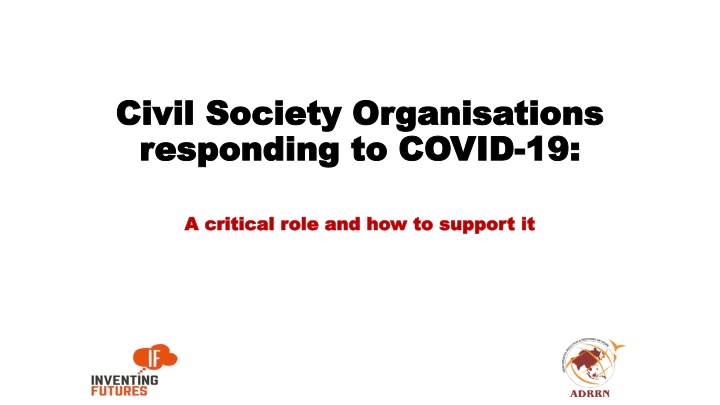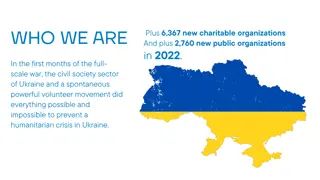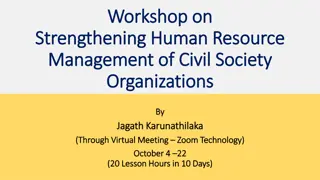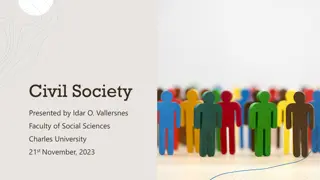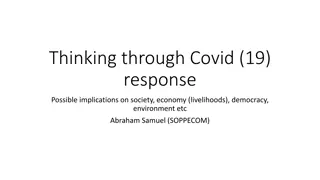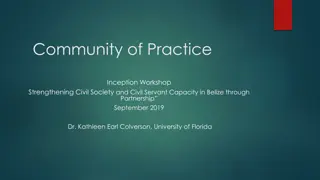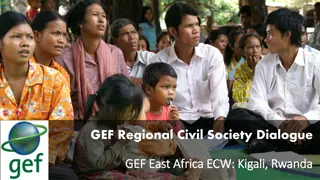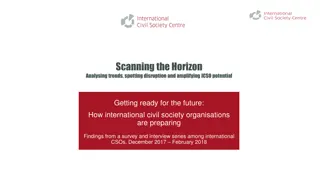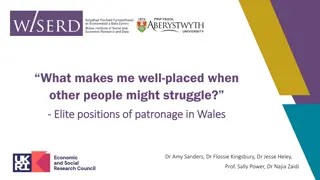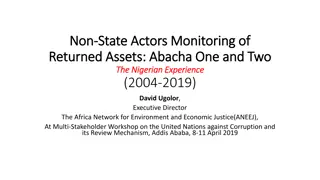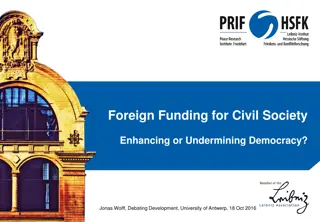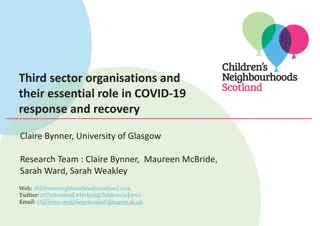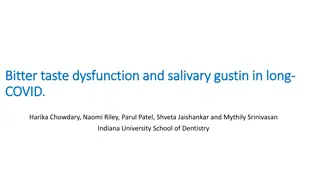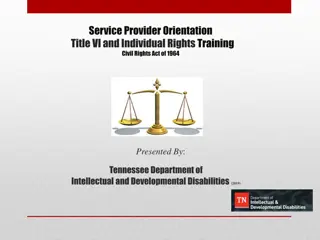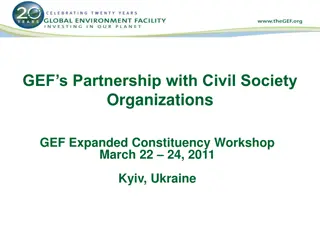Role of Civil Society Organizations in COVID-19 Response
Civil Society Organizations (CSOs) play a critical role in the long-term response and recovery from COVID-19 by bridging local communities with resources, advocating for needs, and enhancing partnerships. Despite challenges such as funding cuts and lack of Disaster Risk Reduction (DRR) focus, CSOs have shown resilience and adaptability in supporting vulnerable populations and facilitating government coordination.
Download Presentation

Please find below an Image/Link to download the presentation.
The content on the website is provided AS IS for your information and personal use only. It may not be sold, licensed, or shared on other websites without obtaining consent from the author.If you encounter any issues during the download, it is possible that the publisher has removed the file from their server.
You are allowed to download the files provided on this website for personal or commercial use, subject to the condition that they are used lawfully. All files are the property of their respective owners.
The content on the website is provided AS IS for your information and personal use only. It may not be sold, licensed, or shared on other websites without obtaining consent from the author.
E N D
Presentation Transcript
Civil Society Organisations Civil Society Organisations responding to COVID responding to COVID- -19: 19: A critical role and how to support it A critical role and how to support it
The Question The Question What part might Civil Society Organisations (CSOs), particularly those working closely with local communities, play in the long-term response to and recovery from COVID-19? National and local CSOs uniquely positioned to build bridges? Role in linking government, agencies and institutions resources to local needs and priorities? Exercise watchdog and advocacy functions?
The Method The Method Participative method: Hearing voices of local-level experience through an iterative and participative consultation with a small group Range of contexts: 18 CSOs and colleagues working across Asia, Africa and the Americas collaborated Collaborative development: Insights collated, edited and circulated over 8 cycles of consultation in a two month period Action orientated recommendations: A living document developed a summary of findings and calls for action which are presented in draft form today
Findings (1) Findings (1) Disaster within a Disaster : In some cases responses to the pandemic have led to state-driven repression and suffering, specifically for the vulnerable (for example in Togo, Senegal and the Philippines). Despite dramatically lower infection and death rates than in many rich economies, draconian lockdowns have been imposed with extremely negative consequences for livelihoods. Such lockdowns are a disaster within a disaster . Trade-off between health and economics: In other cases governments are challenged by the trade-off between health and economic considerations ie lockdowns and other restrictions versus maintaining business and employment, walking a political tightrope. (for example in Bangladesh, Pakistan, Senegal and Nepal) Local Capacities: Governments have often depended on CSOs to maintain service delivery (for example in India, Kenya and Nepal). Spontaneous and informal leadership has also emerged to compensate for failures in formal supply chains
Findings (2) Findings (2) Partnerships and Coordination: CSOs have rich understanding of ways in which the response of government and others could be improved through partnerships, coordination and understanding of local contexts (For example in Cambodia, Kenya, the Philippines, India, Cameroon, Indonesia and Nepal) Funding cuts: Despite the increased demands on CSOs now and into the future, funding sources are being cut locally, nationally and globally (See for example Cameroon, India and Nepal) Lack of DRR thinking: The short-term focus of governments in response to the pandemic, regarding it as a health challenge, has restricted response to livelihood issues, increasing impoverishment of the poorest. In many cases Disaster Risk Reduction thinking is not evident (see for example the Philippines, Kenya, Cameroon and Nepal)
Calls to Action (1) Calls to Action (1) Resources: As the calls on CSOs increase, their resources decrease. Providing core funding (as opposed to projectized, tied funds) is critical to sustaining and strengthening their role. INGOs and other funding agencies should support partner agencies in this way and agencies should create funds which can be accessed by local CSOs to support core costs Who: Donors, governments, INGOs, Foundations, National development agencies, Networks and Platforms should support them by providing financial and technical resources to reduce vulnerabilities to COVID-19 Policies: Government policies and orientations are short term. CSO are more sustainable than political decision makers who have a short-term mandate. While decision-making should be left in the hands of governments, CSO should be recognised as change makers and implementation should be placed in their hands. Who: CSO Networks and Platforms pressing for recognition of CSOs at local and national level
Calls to Action (2) Calls to Action (2) Building partnerships: Local CSOs are bridgebuilders, forging partnerships which strengthen flows of knowledge and resources and enable governments and other actors to respond more effectively. Existing partnerships should be strengthened and new ones forged as an investment in long term effective and targeted recovery. Who: CSOs, Local and national government, facilitating agencies such as UN agencies. Networks, Platforms Advocate for Transformational Disaster Risk Reduction: Sustainable futures depend on much more than the short term magic bullet of vaccines. Many CSOs recognise the importance of Disaster Risk Reduction (allied to Climate Change Adaptation and Sustainable Development) in ensuring long term protection of lives and livelihoods. Unless these principles are foregrounded and adopted, we will lurch from crisis to crisis. CSOs, agencies and networks can partner to advocate for this shift in mindset, particularly at this time of disruption. Who: Formulate specific calls for CSOs to press, networks and relevant agencies such as UNDRR to champion at government and international level
So what? . . . And how? So what? . . . And how? What next? which recommendations should be acted on? Resources: INGOs and other funding agencies should create mechanisms to support partner agencies in this way and agencies should consider creating funds which can be accessed by local CSOs to support core costs Policies: CSO should be recognised as change makers and therefore implementation should be left in their hands. Building partnerships: Existing partnerships should be strengthened and new ones forged as an investment in long term effective and targeted recovery. Advocate for Transformational Disaster Risk Reduction CSOs, agencies and networks can partner to advocate for this shift in mindset, particularly at this time of disruption. Other recommendations: from this consultation? How? Publications: Releases, blogs, documents and reports for different audiences Extending the group: Inviting wider participation in learning and action? Fundraising for local action: Direct channelling of resources to participants through platforms such as Globalgiving?
Further information Further information Reports, slide sets etc. will be posted on the website, where you can also add comments: http://inventing-futures.org/covid-civil-society-organisations/ You can contribute to this consultation through a dedicated multi- language forum at www.drr2dev.com
